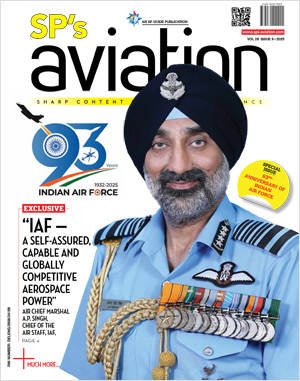INDIAN ARMED FORCES CHIEFS ON OUR RELENTLESS AND FOCUSED PUBLISHING EFFORTS

The insightful articles, inspiring narrations and analytical perspectives presented by the Editorial Team, establish an alluring connect with the reader. My compliments and best wishes to SP Guide Publications.

"Over the past 60 years, the growth of SP Guide Publications has mirrored the rising stature of Indian Navy. Its well-researched and informative magazines on Defence and Aerospace sector have served to shape an educated opinion of our military personnel, policy makers and the public alike. I wish SP's Publication team continued success, fair winds and following seas in all future endeavour!"

Since, its inception in 1964, SP Guide Publications has consistently demonstrated commitment to high-quality journalism in the aerospace and defence sectors, earning a well-deserved reputation as Asia's largest media house in this domain. I wish SP Guide Publications continued success in its pursuit of excellence.
- A leap in Indian aviation: Prime Minister Modi inaugurates Safran's Global MRO Hub in Hyderabad, Calls It a Milestone
- All about HAMMER Smart Precision Guided Weapon in India — “BEL-Safran Collaboration”
- India, Germany deepen defence ties as High Defence Committee charts ambitious plan
- True strategic autonomy will come only when our code is as indigenous as our hardware: Rajnath Singh
- EXCLUSIVE: Manish Kumar Jha speaks with Air Marshal Ashutosh Dixit, Chief of Integrated Defence Staff (CISC) at Headquarters, Integrated Defence Staff (IDS)
- Experts Speak: G20 Summit: A Sign of Global Fracture
No other Way Out

Despite the rhetoric on government support and periodic infusion of funds, chances of a turnaround for the national carrier appear somewhat remote. The old adage that “the government has no business to be in business” could not be more apt than in the case of Air India. If the airline is to survive, there is no alternative to privatisation.
On Sat urday January 14, 2012, hundreds of passengers booked to travel by Air India were stranded at the airports across the country as a section of pilots went on a day-long strike throwing flight schedules out of gear. However, by the end of the day, near normalcy was restored as pilots resumed work in response to assurance from the management that their grievances would be addressed without delay.
Strikes in Air India are triggered often for even trivial reasons. Nearly a year ago, 700 pilots of the Indian Commercial Pilots Association (ICPA), the derecognised union of erstwhile Indian Airlines, went on a strike over issues of parity in emoluments with the ex-Air India pilots. Early January this year, the 8,000-member strong Aviation Industry Employees Guild (AIEG), issued a strike notice to the airline as they had not been paid salary since November 2011 and since August had not received productivity-linked incentive (PLI) which constitutes 70 per cent of their emoluments. This was hardly surprising as the airline has a debt burden of Rs. 43,000 crore and accumulated losses of over Rs. 20,000 crore. The airline also owes Rs. 230 crore to oil companies, undisclosed sums to the Airports Authority of India and over Rs. 400 crore towards repayment of loans. Besides there are other miscellaneous financial commitments such as dues to vendors, caterers, expenditure on maintenance, repair and overhaul, commission to agents, payments towards IT and reservation systems, etc. But as per AIEG, emoluments of employees have been withheld despite rise in passenger revenues by Rs. 109 crore in August and Rs. 1,200 crore equity from the government in the last fiscal. The AIEG perceives this as a total disregard of the welfare of employees and utter mismanagement.
But like strikes, if Air India has displayed any consistency, it has been in respect of mismanagement, more so after Praful Patel’s historic strategic blunder of merger of Indian with Air India. From an annual loss of Rs. 448 crore in 2006-07 pre-merger, losses in 2007-08 jumped to Rs. 2,226 crore, Rs. 4,000 crore in 2008-09, Rs. 5,400 crore in 2009-10 and Rs. 7,000 crore in 2010-11. The management has not only been under pressure battling internal problems of the airline and the obstinate unions, the challenges they have been confronting on account of constant political and bureaucratic interference have been more daunting.
Russi Mody, who was the Chairman and Managing Director (CMD) of Air India in 1993, quit in disgust as his efforts to turn the national carrier around were frustrated by bureaucratic sloth and interference by the government. Michael Mascarenhas, who had been in senior positions with Air India management for several years, was appointed as the CMD in 2001. However, on account of differences with the then Minister of Civil Aviation (MoCA) on his push for privatisation of Air India, he was summarily removed. Similarly, Raghu Menon, a bureaucrat, who took over as the CMD from V. Thulasidas, fell out of favour with the then MoCA and was eased out.





